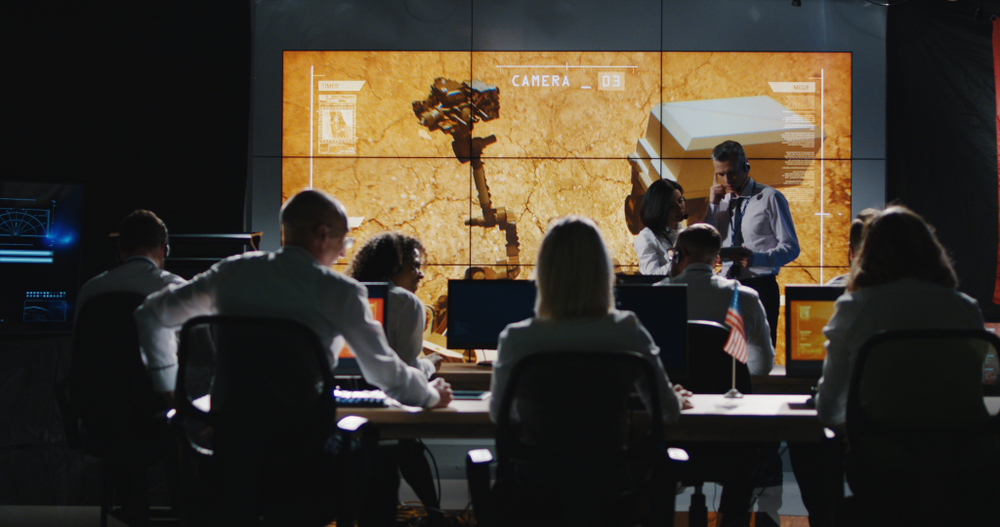MarsLander ITSM Mission Log – 10.03.21
Mission Director Log: 10.03.21Disruption. Transformation. Value

‘The world is in a state of disruption’ thought the Mission Director of Space-Y.”
Digital disruption caused by rapid emerging technologies is suddenly creating new business models and IT is becoming a differentiator.
Then COVID disrupted everything and accelerated the digital disruption, and this, in turn, disrupted the way in which IT needs to be managed.
IT organizations are being disrupted with ‘agile transformations’ – a mushrooming of the latest ‘things’ that IT organizations promised would make everything better, faster, safer, cheaper – ‘agile’ , ‘lean’, ‘DevOps’ and now ‘ITIL®4’.
The Mission director sighed.
It seems that IT is obsessed with ‘things’ and technology and has left the ‘people’, the ‘behaviours’ and the ‘value’ out of the equation thought the Mission director, taking a sip of coffee.
Space-Y is also being disrupted. Space-X, NASA, Russia, China, India and now Abu Dhabi.
Space is suddenly filled with growing competition. Increasing customer demands for new features, the need for agility and at the same time demands for reliability, availability, integrity. The need to balance these growing demands & opportunities AND at the same time adopt these new ways of working.
The Mission Director sighed more deeply.
We don’t have the time or the luxury for large improvement programs to transform the way we work. We must somehow apply a continual approach to learning and improving. But how? Hopefully this new Mission control team would be able to demonstrate how – with this latest ‘ITIL®4 thing’ they keep trying to get him to invest in’ thought the Mission Director.
After all ‘failure is NOT an option’!
End of Mission Director log.
Challenges
Is YOUR business as concerned as the Mission Director? Are you faced with these challenges and a NEED to demonstrate that you can deliver business value with all these latest IT ‘Things’.
Welcome to the MarsLander business simulation. An interactive experiential learning workshop in which end-to-end stakeholders can be brought together to explore and experiment with new agile ways of working.
In the simulation, a team plays the business and IT roles of the Mission control team for the MarsLander mission.
They are challenged with growing business demands, the need to manage business as usual and adopt new agile ways of working. The simulation is played in a number of game rounds allowing teams to experiment with designing, executing, reflecting and improving – together – the way they work.
Between rounds, the team is given a new theory – such as ITIL4 – to apply. To translate theory into practice.
Pink Elephant Simulation day. What happened?
Collaborate & Promote visibility
At the start of the simulation, the team is given time to collaborate and agree HOW they will work together. During design there were many questions, some were simply ignored, there were many decisions and verbal agreements – these were not captured, it was ‘assumed’ that people knew what was decided and what that meant in terms of who does what. The team recognized after this exercise that it was difficult to design and agree on ways of working when you don’t know each other (e.g from different SILOs suddenly having to collaborate end-to-end), not knowing each other’s styles and preferences on how to communicate. This confusion and these assumptions made it difficult to give feedback and correct behaviours, as a result when the Mission launched and opportunities and demands were given to the team there was a lot of waiting, assuming it was somebody else’s role. There was no coaching, no feedback, no supporting or helping with the adoption of new ways of working. Frustration, stress, irritation, anger. Symptoms of these ways of ineffective collaboration.
Start where you are, Progress iteratively with feedback
After the first game round, we stopped and applied ’collaborate and promote visibility’ and ‘progress iteratively with feedback’. The end-to-end team got together and visualized post-its with their feedback ‘What worked well? What needs improving? Are there any unanswered questions? What ideas can we try (To progress iteratively)? We also captured how does it feel and identified frustration, confusion, irritation, anger at the way new working practices was being imposed on the team with little time, little coaching, little support.
It was clear that managers have an important role to play in capturing these types of feedback, and for ensuring appropriate coaching and that teams are empowered to make their own improvements.
Theory into practice
The team applied some ITIL theory, using the Service Value System, Identifying what ‘Focus on value’ really looked like. Translating the guiding principles into repeatable, sustainable behaviours – with feedback and support.
The next round was smoother. It felt better. The team trusted each other, there was a focus on value. Visualization enabled them to make effective decisions and identify bottlenecks and areas to improve.
More importantly, value was being delivered!
The Mission Director sighed. This time it was a sigh of relief!
At the end of the session, we captured ‘What did I learn?’ ‘What can I take away and apply?’ ‘What do we (as an organization) need to take away and apply?’ These were the captured finding.
What did I learn?
- Importance of knowing both your role (and expectations) and everyone else’s (avoid assumptions and enable feedback).
- Focus on customer value (Engage and understand what value is from the different stakeholder perspectives).
- Having the value consistently visible helps a lot (enable effective decision making and fosters a ‘Focus on value’ mindset and behaviours).
- Knowing (agreeing and accepting) your role made all the difference (with support and coaching to be able to fulfil the role).
- Ensuring work carried out relates to value (and understand the impact on value of not doing something).
What can I take away and use?
- Role allocation and responsibility (Ensure these are known, agreed and enabled).
- Improve communication (g. active listening, confirming agreements) and collaboration (engage and empower people to collaborate).
- Bring ITIL thinking into team catch up meetings.
- Education of all teams that problem resolution is important (and make the business case for investing in solving problems).
- Ask for feedback more frequently and ensure that action is taken.
- Don’t assume others understand (the agreements roles, tasks, goals, value) the way you do.
What do we need to take away and apply?
- Focus on Problem resolution (Not features) what problem are we trying to resolve, ensuring that problem management is applied to reduce incidents and impact.
- A feedback loop (Feedback from customer, relate to value and goals), feedback from teams (relate to flow and value realization).
- Reflect on what value means at each point in the value stream, remove non-value adding activities.
- Cascade 7 guiding principles throughout the organization (translating them into repeatable, sustainable, visible, behaviours).
- Communicate the necessity of feedback (foster feedback and create a safe environment to give feedback and the certainty that something will be done with the feedback).
- Value of problem management and the value of identifying and removing waste (SILO and end-to-end waste).
- Ensure people are aware of (and accept) roles and responsibilities.
- Make sure goals are visible (to support prioritization and decision making).
- Proactive not reactive (proactive focus on improvements aimed at developing future flow and value-generating capabilities).
- Record questions/agreements so that we all know what was agreed and we can ensure that questions are addressed.
The simulation experience had allowed the team to experiment and explore with ITIL theory and experiment and apply the behaviours that underpin the guiding principles. As an end-to-end team, they had practised and applied ‘progress iteratively with feedback’ and captured concrete individual and organizations improvement actions to take away to accelerate their adoption of ITIL4.
Do you want YOUR Mission Director to sigh in frustration or to sigh in relief, as people demonstrate they can translate theory into practice and knowledge into results?
Sign up for your MarsLander mission experience today. Remember. Failure is NOT an option.
You can also arrange your own simulation day here
Register your interest for the next simulation event
|
